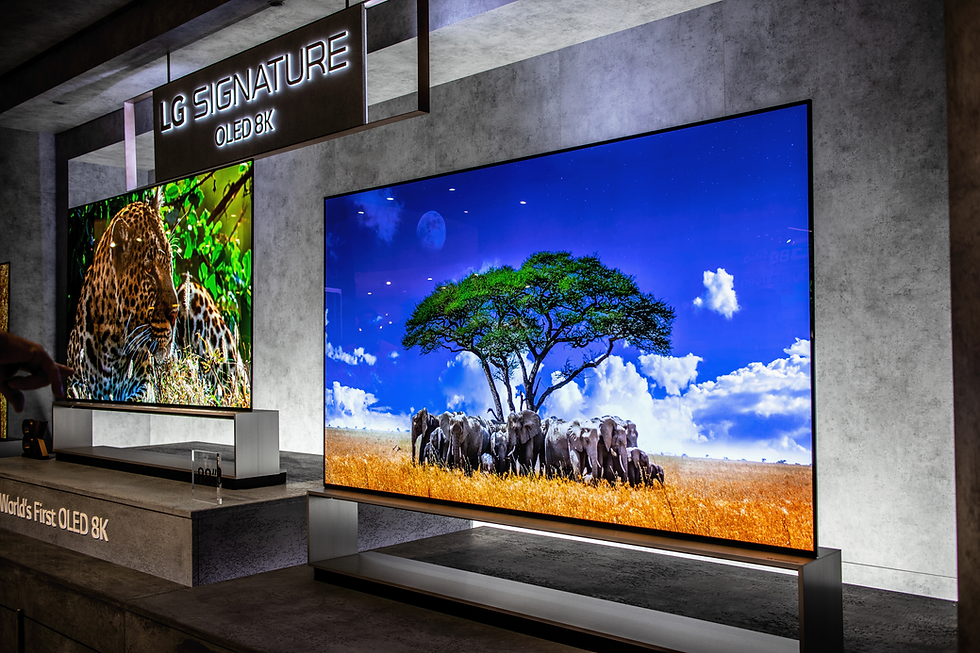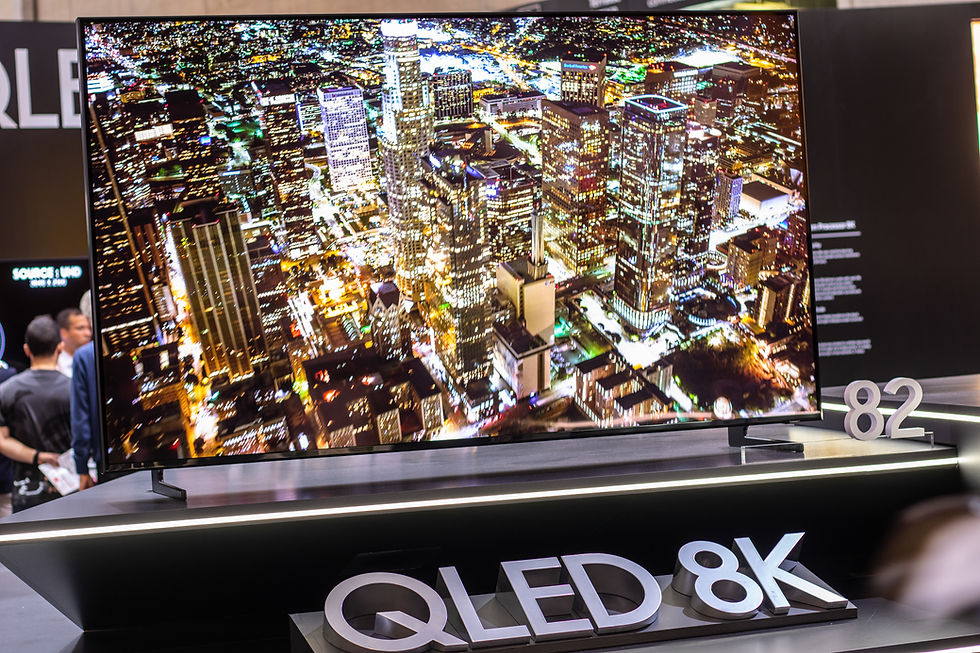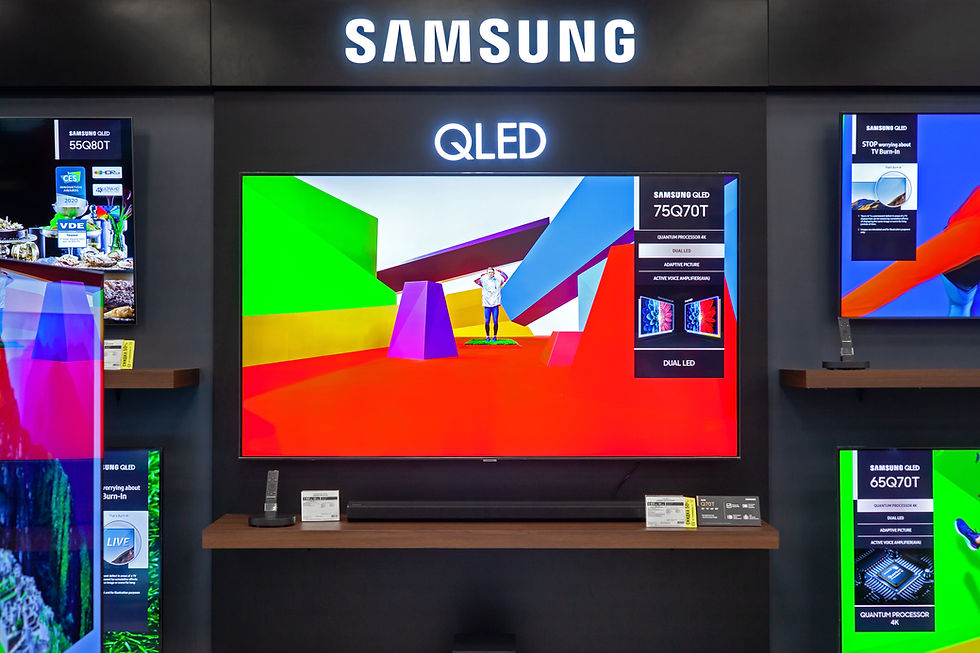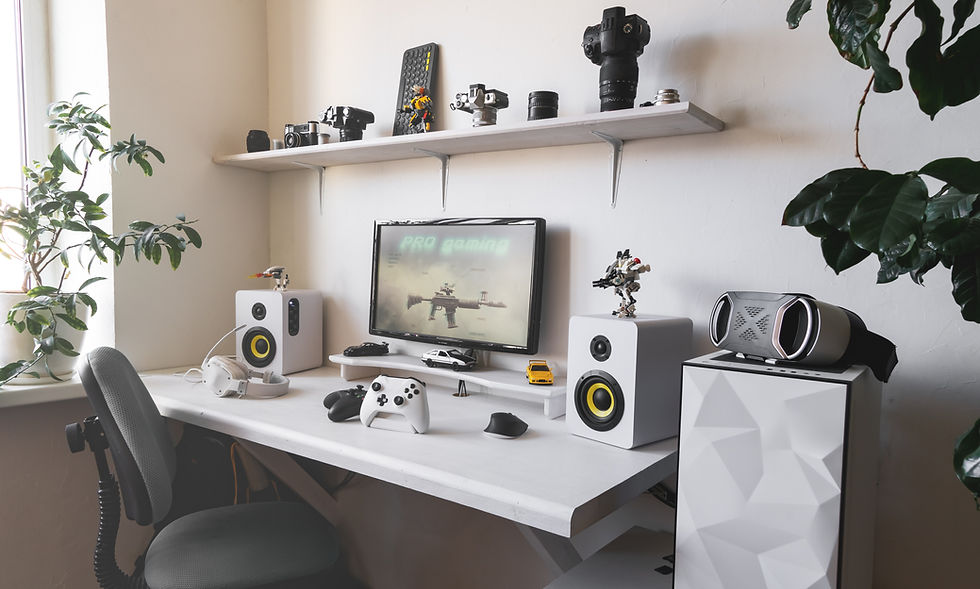In recent years, the world of television technology has been rapidly advancing. One of the most notable developments has been the emergence of 8K TVs, which offer four times the resolution of 4K TVs. As we move into 2023, consumers are faced with a difficult decision: should they invest in an 8K TV or stick with a 4K model? In this blog post, we will explore the key differences between 8K and 4K TVs and help you determine which one is the best choice for your needs in 2023. Whether you're a movie buff, a gamer, or just someone who wants the best viewing experience possible, this post will provide you with the information you need to make an informed decision.

8k vs 4k TVs Resolution
The technical differences between 8K and 4K resolution can be explained by looking at the number of pixels each resolution has. 8K resolution, also known as Ultra High Definition (UHD), has a resolution of 7680 x 4320, which equates to 33.2 million pixels. On the other hand, 4K resolution, also known as Ultra HD, has a resolution of 3840 x 2160, which equates to 8.3 million pixels.
This means that 8K resolution offers four times the resolution of 4K resolution. This increased
resolution results in a much more detailed and clear image, with sharper lines, more accurate colors, and a wider viewing angle. Furthermore, 8K resolution also allows for larger screen sizes while still maintaining a high level of image quality, while 4K resolution has a limit in terms of how big the TV can be before the image quality starts to deteriorate.
The Availability of 8k Content :
The current availability of 8K content is quite limited. As of now, there are only a few streaming services, such as YouTube and Vimeo, that offer 8K content, and the selection is relatively small. In addition, most of the content currently available in 8K is in the form of short videos and clips, rather than full-length movies or TV shows.
However, it's worth noting that the availability of 8K content is expected to increase in the future. For example, major players in the entertainment industry, such as Netflix, Amazon, and Disney, have all announced plans to produce 8K content in the near future. Additionally, the increasing popularity of 8K TVs is likely to drive more content creators to produce 8K content to meet the demand.
It's also worth mentioning that 8K is the next-gen in the resolution standard and it's expected that the 8K content will not only be limited to streaming services but also TV broadcasting, which will increase the availability of 8K content. The 8K association and other industry bodies are working on standardizing the 8K transmission and it is expected that by 2023, 8K transmission will be available in most countries.

In short, while the availability of 8K content is currently limited, it is expected to increase in the future as more streaming services and content creators begin to produce 8K content.
When it comes to content availability, there is currently a significant difference between 8K and 4K. As mentioned before, while the availability of 8K content is quite limited, the availability of 4K content is much more abundant.
Most streaming services, such as Netflix, Amazon, and Disney+, offer a wide selection of 4K content, including movies, TV shows, and live sports. Additionally, many cable and satellite providers now offer 4K programming. Even 4K Blu-ray discs are available in the market which is a great way to experience 4K content.

Furthermore, most major Hollywood studios and production companies have begun to shoot their content in 4K, ensuring a steady supply of 4K content for years to come. This abundance of 4K content means that consumers who invest in a 4K TV will have access to a wide variety of high-quality content, while those who invest in an 8K TV will have a more limited selection.
In summary, while 8K resolution offers a higher level of image quality, the limited availability of 8K content means that consumers may not be able to fully take advantage of their 8K TV's capabilities. On the other hand, 4K content is readily available and offers a great viewing experience. It's worth considering whether the increased resolution of 8K is worth the limited availability of content when making a decision to buy a new TV.
Price Comparison
When it comes to price, 8K TVs are generally more expensive than 4K TVs. As 8K technology is relatively new and still in the early stages of adoption, the cost of production is still relatively high, which means that 8K TVs are typically priced at a premium.
Currently, the prices of 8K TVs range from around $1,500 to $5,000 or more depending on the brand and features. On the other hand, 4K TVs can be found at a much more affordable price point, with prices ranging from around $400 to $1,500 or more.
It's worth noting that prices of 8K TVs are expected to come down in the future as more manufacturers start producing 8K TVs and economies of scale are achieved. Additionally, as the technology matures and becomes more mainstream, the prices of 8K TVs are likely to become more competitive with those of 4K TVs.
In summary, currently 8K TVs are more expensive than 4K TVs, but this gap is expected to close in the future. When considering the purchase of a new TV, it's worth thinking about whether the added resolution of 8K is worth the additional cost, or if a 4K TV would meet your needs and budget.
The question of whether the difference in price between 8K and 4K TVs is worth the difference in resolution is a subjective one. It depends on the individual's specific needs, preferences, and budget.
For some, the increased resolution of 8K may be worth the added cost. The added detail and clarity offered by 8K resolution can result in a more immersive and realistic viewing experience, particularly when watching high-action content or nature documentaries. Additionally, the larger screen size that 8K resolution allows for can be a major selling point for some consumers.
On the other hand, for others, the added resolution may not be worth the added cost. With the limited availability of 8K content, the increased resolution may not be fully utilized. Additionally, the difference in resolution may not be as noticeable on smaller screens or when viewing content that is not shot in 8K.
It's also worth considering that 8K TVs come with new features like higher refresh rate, better color accuracy and wider viewing angle which can enhance the viewing experience. It's important to weigh the additional features and the overall viewing experience with the cost and the content availability before making a decision.
Ultimately, whether the difference in price between 8K and 4K TVs is worth the difference in resolution is a personal decision that will depend on the individual's needs, preferences, and budget. It's important to do your research, consider your viewing habits and make an informed decision.
Gaming Performance
When it comes to gaming performance, 8K and 4K TVs offer different advantages and disadvantages. 8K TVs, with their increased resolution, offer a more immersive gaming experience with more detailed and realistic graphics. Additionally, 8K TVs often have a higher refresh rate and a lower input lag, which can result in smoother gameplay, particularly in fast-paced games.
However, 4K TVs also offer a great gaming experience, and the difference in resolution may not be as noticeable when playing games, especially on smaller screens. Additionally, 4K TVs often have a lower price point, which can make them a more affordable option for gamers on a budget.
It's worth noting that in order to take advantage of the increased resolution offered by 8K TVs, gamers will need to have a high-end graphics card and a powerful gaming PC that can handle the increased demands of 8K gaming. Also, 8K gaming will require a lot of bandwidth and it's important to have a fast internet connection to avoid buffering while gaming.
In summary, while 8K TVs offer a more immersive gaming experience with more detailed graphics, 4K TVs are still a great option for gamers and offer a great gaming experience. It's important to consider your budget, the size of your screen and your gaming setup before making a decision.
For gamers looking to upgrade their TV, understanding the differences in gaming performance between 8K and 4K TVs is crucial. The gaming experience is heavily influenced by the TV's resolution, refresh rate, and input lag.
A higher resolution like 8K can offer more detailed and realistic graphics, which can make the gaming experience more immersive. Additionally, a higher refresh rate can make the gameplay smoother and less prone to tearing, while a lower input lag can make the controls more responsive.
These factors can be especially important for gamers who play fast-paced, competitive games, such as first-person shooters or racing games, as a higher resolution, higher refresh rate and lower input lag can give them a competitive edge. Additionally, for games that support 8K resolution and have 8K textures, the gaming experience can be truly breathtaking and immersive.
On the other hand, for gamers who are on a budget and don't have a powerful gaming PC, 4K TV can still offer a great gaming experience and the difference in resolution may not be as noticeable when playing games, especially on smaller screens.
In short, for gamers looking to upgrade their TV, it's important to consider their gaming habits and preferences, budget, and their gaming setup before making a decision. A TV that offers a great gaming experience can make a big difference in the overall enjoyment of the game.
Additional Features
8K TVs often come with additional features that 4K TVs do not. Some of the most notable additional features include:
Higher refresh rate: 8K TVs often have a higher refresh rate than 4K TVs, which can result in smoother and more fluid motion when watching fast-paced content.
Better color accuracy: 8K TVs also often have a wider color gamut and better color accuracy than 4K TVs, which can result in more vibrant and lifelike colors.
Wider viewing angle: 8K TVs also often have a wider viewing angle than 4K TVs, which can make it possible to enjoy a great viewing experience from different positions in the room.
Better contrast ratio: 8K TVs have a better contrast ratio than 4K TVs which can make the image appear more natural and less artificial.
It's worth considering whether these additional features are worth the higher cost when making a decision to buy a new TV. For some consumers, the added features may be worth the added cost, while for others, the added features may not be as important. It's also important to consider the content availability, viewing habits and the overall viewing experience when making a decision.
In short, while 8K TVs offer a higher resolution and some additional features over 4K TVs, it's important to consider whether these additional features are worth the higher cost when making a decision to buy a new TV. It's always a good idea to weigh the pros and cons and make an informed decision based on your needs and budget.

Conclusion
In conclusion, 8K and 4K TVs both offer a high-quality viewing experience, but they have some key differences that consumers should consider when making a decision to buy a new TV. 8K TVs offer four times the resolution of 4K TVs, which can result in a more detailed and clear image with sharper lines, more accurate colors, and a wider viewing angle. However, the availability of 8K content is currently limited, and it may not fully take advantage of the increased resolution. Additionally, 8K TVs are currently more expensive than 4K TVs. On the other hand, 4K TVs offer a great viewing experience, with an abundance of 4K content readily available and it's more affordable than 8K TVs.
When it comes to gaming, 8K TVs offer a more immersive gaming experience with more detailed graphics, higher refresh rate and lower input lag. But, it requires a powerful gaming setup and a fast internet connection. 4K TVs still offer a great gaming experience and the difference in resolution may not be as noticeable when playing games, especially on smaller screens.
It's important to consider the content availability, viewing habits, budget, and overall viewing experience when making a decision. Additionally, 8K TVs come with additional features like higher refresh rate, better color accuracy, wider viewing angle and better contrast ratio which can enhance the viewing experience. Ultimately, whether to invest in an 8K or 4K TV is a personal decision that will depend on the individual's needs, preferences, and budget.
Comments